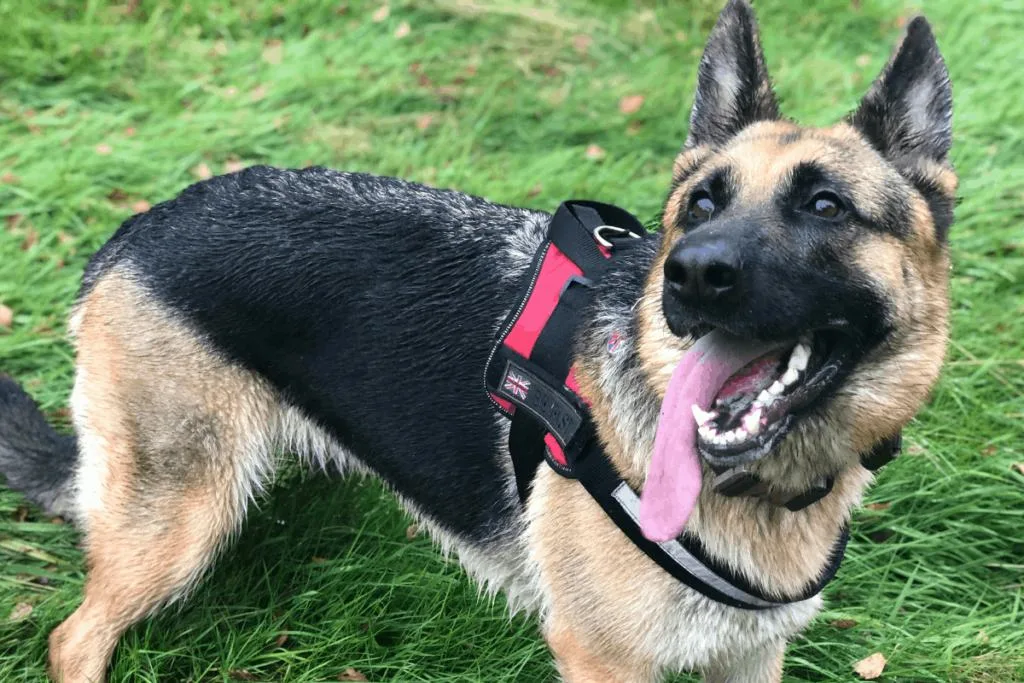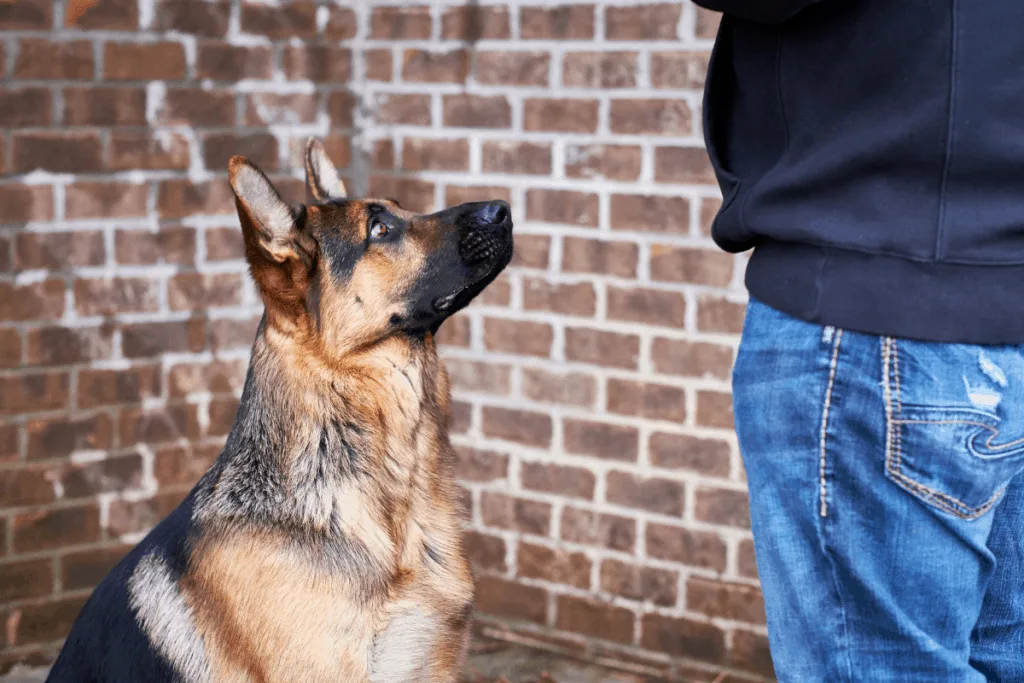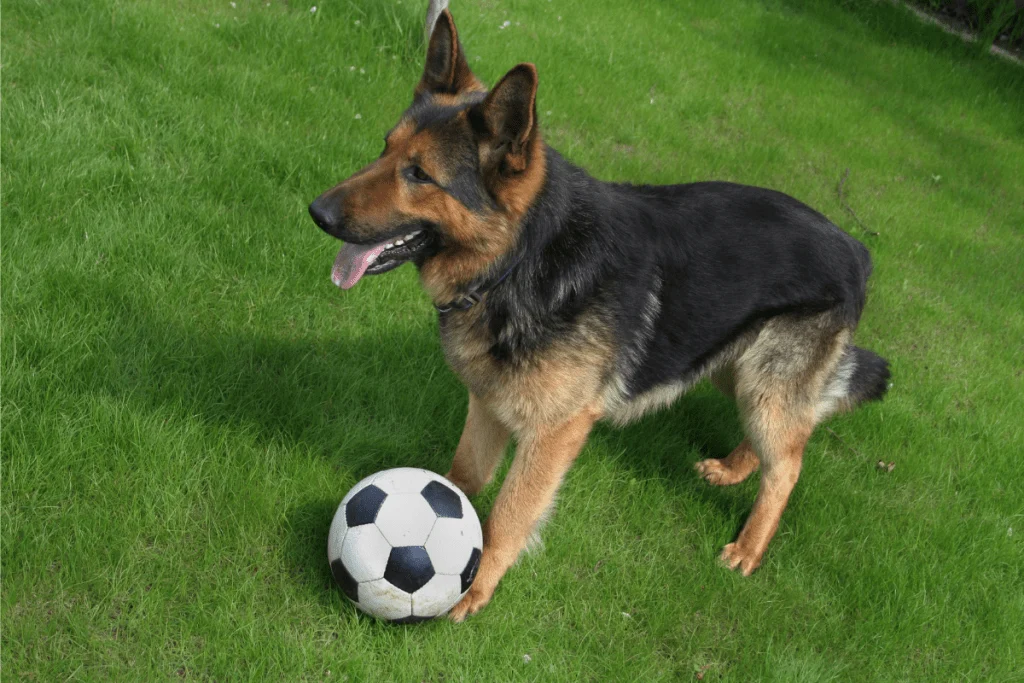
If you have been in contact with German Shepherd owners, or if you have been online researching this breed, you may have come across terms like ‘needy’ and ‘separation anxiety’ when describing these dogs.
These things can at times be true, but these terms need to be put in proper context. So how exactly do German Shepherds need lot of attention?
German Shepherds need a lot of attention in the sense that they need plenty of quality time with their owners and can suffer from separation anxiety when left alone. They also require proper socialization, training, lots of exercise, and regular grooming.
If you are looking at adopting or buying a German Shepherd, you should be prepared to meet its needs.
After all, your German Shepherd is entirely reliant on you. Let’s look at what kinds and levels of attention German Shepherds require.
Click Here to Jump to a Section
German Shepherds Require Lots Of Interaction With Their Owners
German Shepherds are not needy dogs. They do not require lots of cuddling and are not likely to try to curl their massive forms into your lap (thank goodness!).
However, they are emotionally dependent on their owners, forming deep and lasting bonds.
German Shepherds are typically one-person dogs. This arises from their history as sheep herding dogs and, later, police and military dogs.
Related: Why Are German Shepherds Good Police Dogs?
In these professions, German Shepherds worked and even lived closely with one person and in a protective capacity. Trust between German Shepherd and owner or handler was mandatory.
Related: 20 Most Loyal Dog Breeds That Attach To One Person
Thus, to their chosen person, German Shepherds are intensely loyal and instinctively protective. They will also be loyal to and protective of every member of the household in which their person lives.
Related: Will My German Shepherd Protect Me Without Training?
As mentioned, German Shepherds won’t necessarily curl up on your lap, although each dog is different, and some may require more physical affection than others.
However, almost all German Shepherds are faithful shadows and want to go where you go.
If you go into the garden to do some weeding, your German Shepherd will be right behind you. If you go to the bathroom, you will likely have your German Shepherd watching and guarding you in your vulnerable state.
Your German Shepherd assumes that you will devote yourself as fully to them. They will be very hurt if you were to lock them up or lock them out of your daily activities.
German Shepherds also become upset when they are separated from their owners for any length of time.
If you live alone and are at work all day, working the proverbial nine-to-five job, you might need to think about getting a different breed unless you live close enough to come home in your lunch hour to spend time with your German Shepherd.
If you work nine-to-five but live with a family who stays home, your German Shepherd may be able to console themselves with your spouse or another member of your household until you get home.
However, this person will never take your place, and your German Shepherd will still eagerly await your return.
Separation Anxiety and German Shepherds
As a result of this intense loyalty, German Shepherds are prone to developing separation anxiety.
Dogs who suffer from this condition are not just sad when their owners leave the house; they become panicked at the separation and will turn to destructive and potentially self-harming behaviors.
German Shepherds with separation anxiety may chew or scratch furniture and walls. Or they may start to obsessively groom, creating bald patches and even lesions.
Dogs have even been known to throw themselves over fences, etc., and get hurt in the process.
Separation anxiety is more likely to affect German Shepherds if their owner’s routines are unpredictable, i.e., they come and go at irregular times and for unspecified durations.
Additionally, if you were staying at home with your German Shepherd and you suddenly start going to your full-time job five or six times a week, this change can spark anxiety conditions.
For more on German Shepherd separation anxiety, be sure to read this excellent article that we have for you linked below:
How to Deal with German Shepherd Separation Anxiety
Separation anxiety, as we’ve mentioned, can be a serious issue for German Shepherds, so be sure to pay close attention to the information in the above linked article, as it’s full of useful information on the topic.
German Shepherds Require Socialization And Lots Of Training And Exercise

The attention that your German Shepherd requires is not just limited to affection and constant proximity. They need lots of exercise and deliberate training.
Socialization and German Shepherds
A German Shepherd’s training needs to begin with socialization. As sheep herders, these dogs were not bred for their ability to handle crowds and lots of stimuli.
Therefore, they need help adjusting to these situations. This is the purpose of socialization.
You need to ensure that your German Shepherd puppy is exposed to different people, animals, sounds, sights, smells, and environments.
Without proper socialization, your German Shepherd can become overprotective, which is problematic in such a large and capable dog. They can also become aggressive, anxious, and noise-sensitive.
Related: How To Socialize Your German Shepherd
Socializing your German Shepherd puppy will require a lot of attention and time.
Your breeder should start the process, and simply being with their mother and littermates will help your German Shepherd. But you will have to continue the process when you bring them home.
Training Your German Shepherd
German Shepherds require training. As with socialization, training helps to prevent overprotectiveness and aggression.
The size and capability of German Shepherds also make the ability to control them a necessity.
Training provides physical and mental stimulation for your highly active and highly intelligent German Shepherd, who can develop unwanted and destructive behaviors when bored or pent up.
Additionally, training provides dedicated bonding time between an owner and their German Shepherd, which emotionally satisfies the dog (and human).
German Shepherds benefit from further training, i.e., more than just obedience training. You can train them for agility, herding, tracking, etc.
The necessary training of your German Shepherd will require lots of your time and attention.
But don’t worry, we’ve got you covered – be sure to read the excellent article that we have for you linked below, as it covers all you need to know about training your German Shepherd.
German Shepherd Training Guide: All You Need to Know
Exercising Your German Shepherds

German Shepherds are high-energy dogs and need at least one hour of intense exercise each day (be careful with growing puppies).
In addition to this, they need a large yard in which to run around.
Even if you have a large yard, you will have to dedicate time and energy to exercising with your German Shepherd.
Remember, they are your shadow. If you don’t go into the yard, they are not likely to go alone. If they do go alone, they will soon return or come and check on your regularly.
This will prevent them from self-exercising sufficiently to satisfy their needs.
Canine sports training is an excellent way to burn off some of this energy, but it still involves you.
German Shepherds Require Regular Grooming
If you get a German Shepherd, you will also need to devote time and attention to their grooming needs.
German Shepherds are sometimes, and aptly, called ‘German Shedders’ due to their propensity for excess shedding.
In addition to their ongoing shedding, German Shepherds ‘blow’ twice a year. During these times, your house may end up looking like a snowstorm hit it, so be prepared.
Be sure to check out the articles linked below for more detailed information on German Shepherd shedding and grooming:
Do German Shepherds Shed? All You Need to Know
Grooming a German Shepherd: All You Need to Know
Weekly brushing will help to manage the regular shedding, but you will have to increase this when your dog is blowing its coat.
For a complete list of everything you need to properly groom your German Shepherd, take a look at the article linked below. We’ve assembled all you need in one place:
The Best Grooming Products for Your German Shepherd
German Shepherds Have Sensitive Digestive Tracts
If you are looking for a bowl-of-kibble-twice-a-day dog, a German Shepherd is not the dog for you.
They are picky eaters and prone to food allergies and the incredibly dangerous condition known as Gastric Dilatation Volvulus (GDV).
GDV is also known as bloating, but in German Shepherds, it involves torsion of the stomach and loss of blood supply to various digestive tract organs. It is a medical emergency that can quickly result in death if not treated.
Related: German Shepherd Upset Stomach: A Complete Care Guide
You will have to pay attention to what, how, and when your dog is eating to note any adverse reactions. You might also have to investigate alternative diets and home-cooked meals.
Final Thoughts
For the right person and in the right home, a German Shepherd can’t be beaten as a companion.
They will not leave your side, and you will never feel unloved. In return, they expect and deserve your devotion.
This devotion needs to extend beyond quality time and physical affection, although both of these are vital.
You need to ensure that your German Shepherd’s exercise and mental needs are being met through intentional exercise and training.
German Shepherds aren’t the easiest breed to groom, either, and they are known to have special dietary requirements and concerns.
Yes, German Shepherds need a lot of attention, but they are worth every moment. The more attention you give your German Shepherd, the more fulfilling you will find ownership to be!
